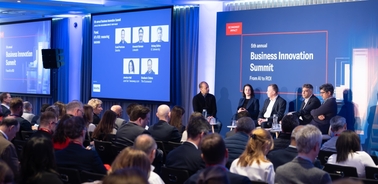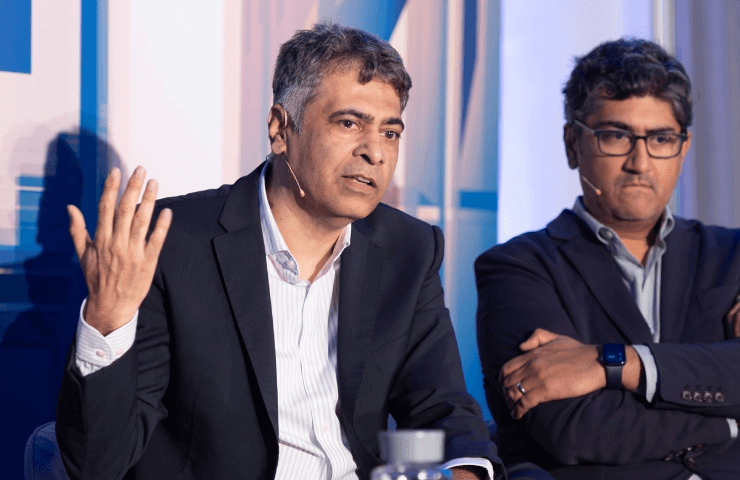IE School of Science & Technology debates AI’s ROI at The Economist Business Innovation Summit

Dean Ikhlaq Sidhu joins global executives and thought leaders to explore AI and its real-world impact.
Ikhlaq Sidhu, Dean of IE School of Science & Technology, took part in the 5th annual Business Innovation Summit, hosted by The Economist on March 25–26, 2025, in London. The event brought together global business leaders from across industries and disciplines to explore how AI and other emerging technologies are transforming the workplace, enabling innovation and driving sustainable growth.
Dean Sidhu joined the panel titled "AI’s ROI: Measuring Success", alongside Aneesh Raman (Chief economic opportunity officer, LinkedIn), Jessica Hall (Chief product officer, Just Eat Takeaway.com), and Costi Perricos (Global gen AI Llad, Deloitte), and moderated by Shailesh Chitnis, Global Business Correspondent at The Economist. Together, they explored the challenges involved in measuring AI’s financial and operational impact, and how companies can move beyond cost-cutting to unlock sustained strategic value.
The discussion addressed several key challenges, including which metrics are most effective for evaluating the return on investment (ROI) in AI, how leaders should balance short-term gains with long-term strategic outcomes, and where companies are already seeing clear value from AI adoption.
Dean Sidhu, who joined the event for the second year in a row, contributed his insights on the evolving role of technical talent in the age of AI. "When it comes to job transitions, there are a number of uninformed people who think that Computer Science (CS) will be less relevant with AI, but as confirmed by LinkedIn executives, the truth is that tech and CS people are getting bigger and broader jobs, which can take their work farther toward the end customer. Many skills are now more important than before, including complex systems such as with computer science, interpersonal skills, product management, judgment, critical thinking and speed in adapting," he argued.
A key theme that emerged from the conversation was that one of the measures of the future will not be cost or revenue, but instead an organization’s pace of change. "One of the true measures of organizational success will be how quickly companies can adapt to change," Dean Sidhu noted.
Ikhlaq Sidhu also emphasized a shift in the digital divide: "The new digital divide won’t be about access to technology, but about possessing deeply human skills like curiosity, creativity, compassion, communication, and vision." In his opinion, those students and employees who know how to collaborate with AI will grow. Others will need to develop these human-oriented skills to stay relevant.
The panel also explored the limits of AI, reminding that, while AI can mimic human behavior, it does not have the information needed to be human. "AI can perform many functions with impressive precision, but some human motivations lie beyond its understanding—and they are rooted our consciousness, something even we, as humans, don't fully have access to", he highlighted.
This year’s summit, titled "From AI to ROI", gathered in London senior executives from a wide range of industries and disciplines—including strategy, technology, operations, and data. Sessions addressed key issues such as how to strike the right balance between automation and human labor, how to ensure companies are "AI-ready" to harness internal data and improve workflows, and how to avoid corporate disasters caused by poorly managed AI.
